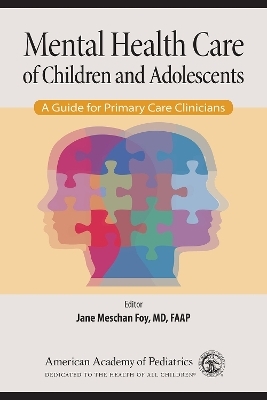
Mental Health Care of Children and Adolescents
American Academy of Pediatrics (Verlag)
978-1-61002-150-0 (ISBN)
Topics covered include:
Assessing and monitoring children’s mental health in primary care
Family-centered care and how-to apply behavioral change science
Anticipatory guidance, surveillance and screening
Care of special populations
Psychotropic medications in primary care
Common signs and symptoms
Jane Meschan Foy, MD, FAAP, has spent more than 35 years in pediatric primary care, public health, administration, and medical teaching. Her special interests include mental health services in pediatric primary care and school settings, access to health care for underserved populations, primary care of children with special health care needs, and residency training in mental health, community pediatrics, and advocacy. Dr Foy received her bachelor of arts from Wellesley College and her doctorate of medicine from University of North Carolina at Chapel Hill School of Medicine. She completed her residency training in pediatrics at University of North Carolina hospitals. She has held several academic positions and is currently professor of pediatrics at Wake Forest University School of Medicine and medical director of the Northwest Community Care Network (a regional network of North Carolina Medicaid providers). She is active in the American Academy of Pediatrics (AAP), having served as chair of the AAP Task Force on Mental Health from 2004 to 2010 and currently serving as past chair of the AAP National Committee on Psychosocial Aspects of Child and Family Health; member of the AAP Mental Health Leadership Work Group, and member of the AAP Board of Directors. Roles in other organizations have included the presidency of the North Carolina Pediatric Society (North Carolina Chapter of the AAP) from 1998 to 2000 and cofounder and director of the School Health Alliance for Forsyth County from 1999 to 2011.
Introduction
Part I: Framework for enhancing children’s mental health
Community strategies
1. Promoting the Social-Emotional Health of Young Children
2. Promoting Adolescents' Mental Health
3. Promoting Mental Health in Schools
4. Partnering to Improve Community Mental Health Systems
Practice strategies
5. Office and Network Systems to Support Mental Health Care
6. Assessing and Monitoring Children’s Mental Health in Primary Care
7. Family-Centered Care: Applying Behavior Change Science
8. Culturally Effective Care
Part II: Anticipatory guidance, surveillance, and screening
The primary care advantage
9. Promoting mental health in pediatric practice
Preventive themes
10. Healthy Child Development
11. Family Support
12. Healthy Sleep
13. Healthy Weight
14. Healthy Use of Media
15. Healthy Active Living
16. Violence Prevention
17. Healthy Sexual Development and Sexuality
Care of special populations
18. Children Exposed to Adverse Childhood Experiences
19. Families New to the United States
20. Children in Foster or Kinship Care
21. Adopted Children
22. Children in Poverty
23. Children of Divorce
24. Children in Military Families
25. Lesbian, Gay, and Bisexual Youth
26. Children with Gender Expression and Identity Issues
27. Children in Gay- and Lesbian-parented Families
28. Children in Self-care
29. Homeless Children
30. Children Affected by Racism
31. Children with Chronic Medical Conditions
32. Adolescents who are Pregnant or Parenting
33. Children in the Juvenile Justice System
Part III: Addressing mental health concerns in children
General principles and process
34. Pediatric Care of Children with Mental Health Problems
Elements of care
35. Effective Communication Strategies: Common Factors Skills
36. Interviewing Adolescents
37. Counseling Parents of Adolescents
38. Psychosocial Therapies
39. Adapting Psychosocial Interventions to Primary Care
40. Psychotropic Medications in Primary Care
41. Self-Regulation Therapies and Biofeedback
42. Complementary and Integrative Medical Therapies
43. Transitioning Youth with Mental Health Conditions to Adult Care
Common signs and symptoms
44. Agitation, Suicidality, and Other Psychiatric Emergencies
45. Anxiety and Trauma-related Distress
46. Disruptive Behavior and Aggression
47. Eating Abnormalities
48. Emotional or Behavioral Disturbance in Children Younger than Five Years of Age
49. Family Dysfunction
50. Inattention and Impulsivity
51. Learning Difficulty
52. Low Mood
53. Maternal Depression
54. Medically Unexplained Symptoms
55. Non-adherence to Medical Treatment
56. School Absenteeism and School Refusal
57. Self-injury
58. Sleep Disturbances
59. Speech and Language Concerns
60. Substance Use I: Use of Tobacco and Nicotine
61. Substance Use II: Use of Other Substances
62. Substance Use III:Specialty Referral and Co-management
Appendix
| Erscheinungsdatum | 01.09.2018 |
|---|---|
| Verlagsort | Elk Grove Village |
| Sprache | englisch |
| Maße | 152 x 228 mm |
| Gewicht | 1500 g |
| Themenwelt | Medizin / Pharmazie ► Gesundheitswesen |
| Medizin / Pharmazie ► Medizinische Fachgebiete ► Pädiatrie | |
| ISBN-10 | 1-61002-150-9 / 1610021509 |
| ISBN-13 | 978-1-61002-150-0 / 9781610021500 |
| Zustand | Neuware |
| Haben Sie eine Frage zum Produkt? |
aus dem Bereich


